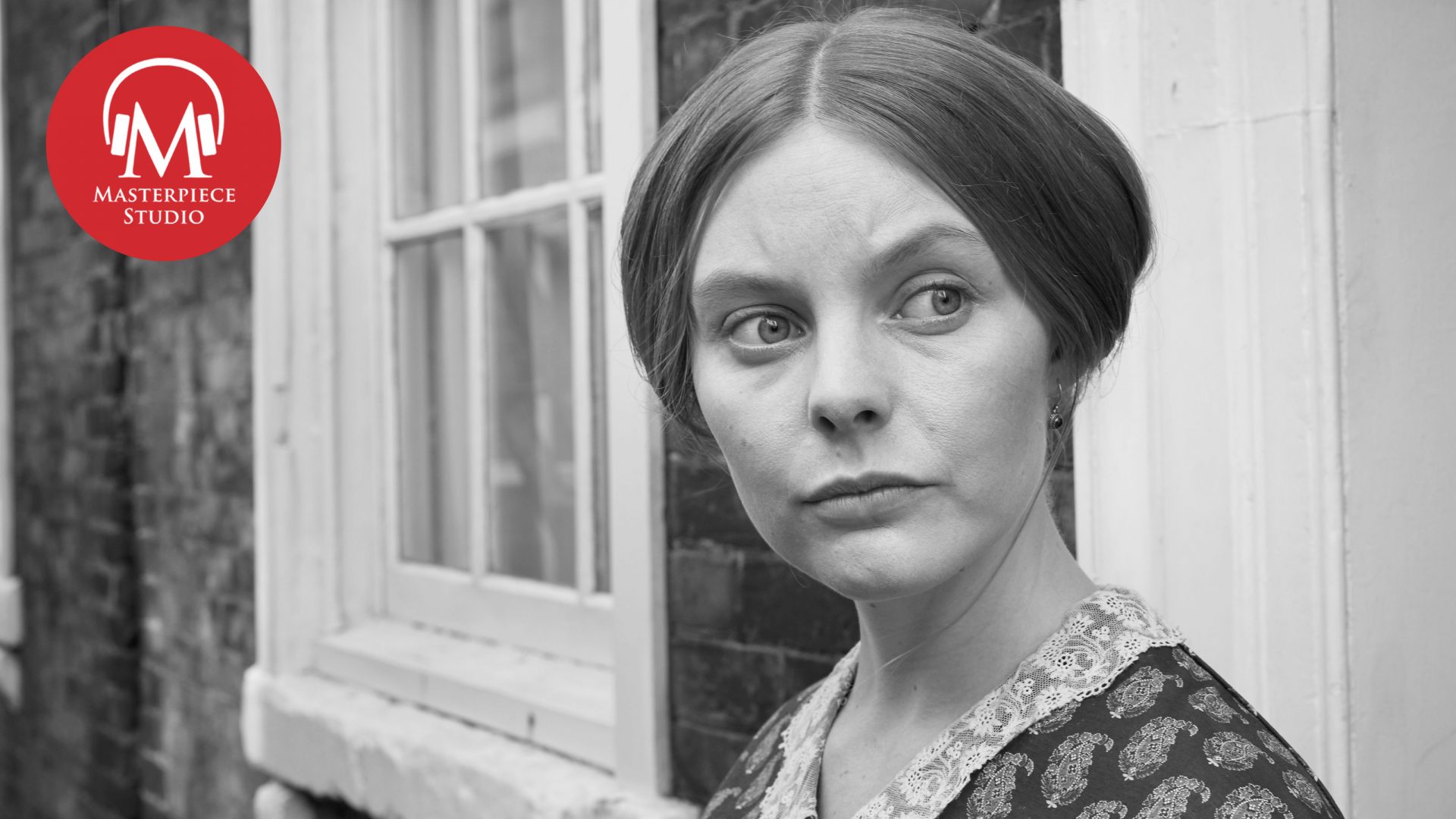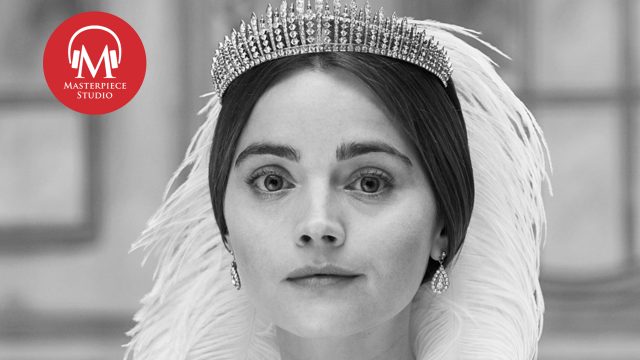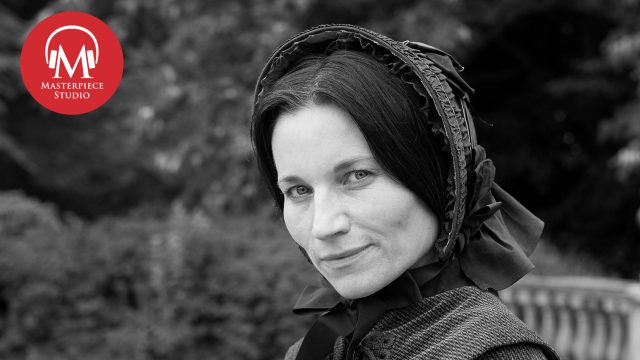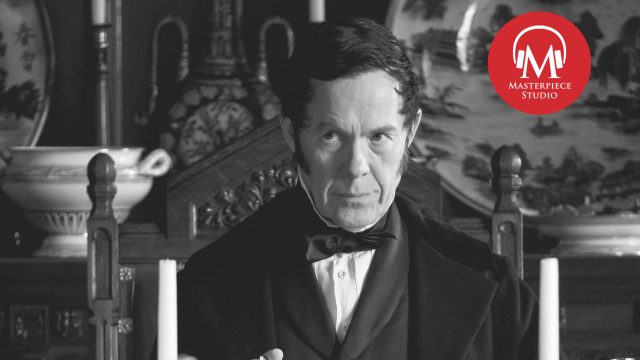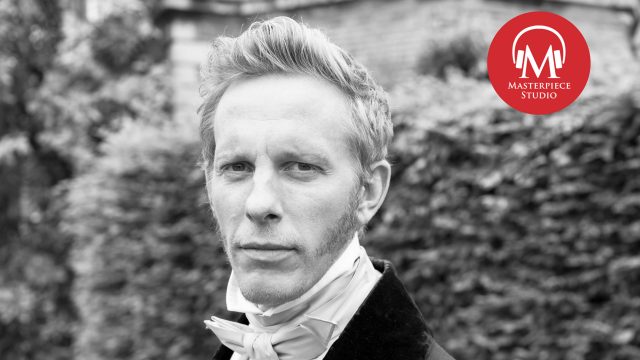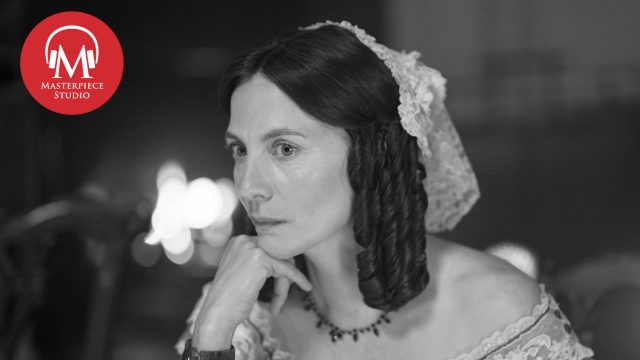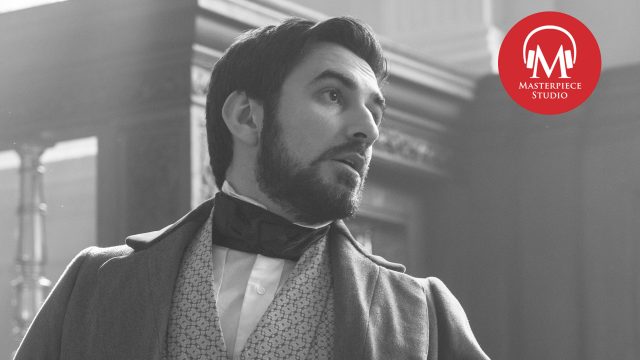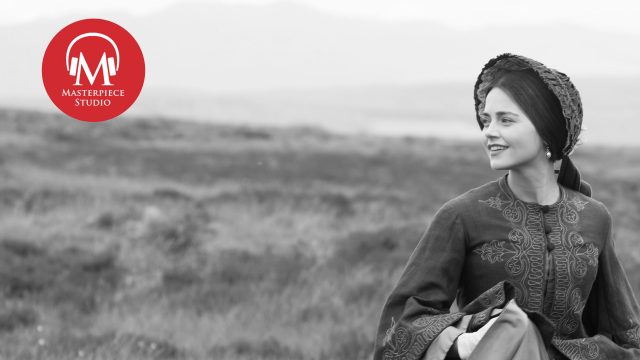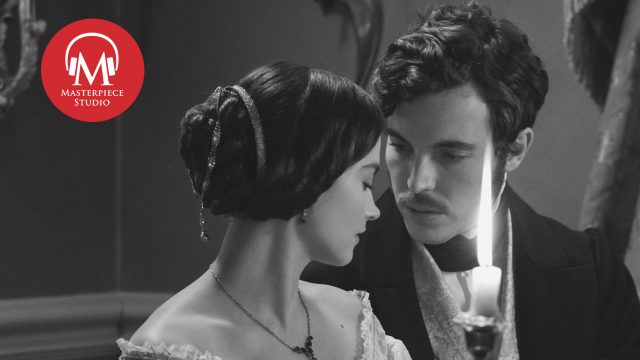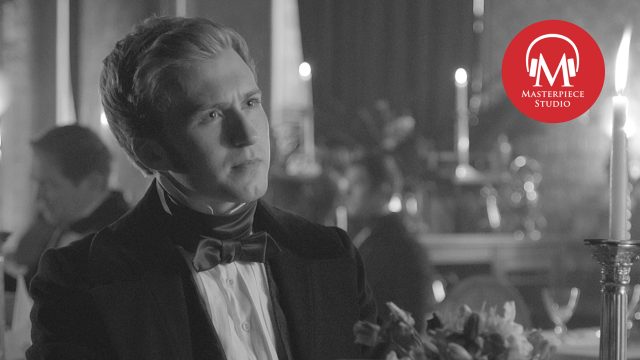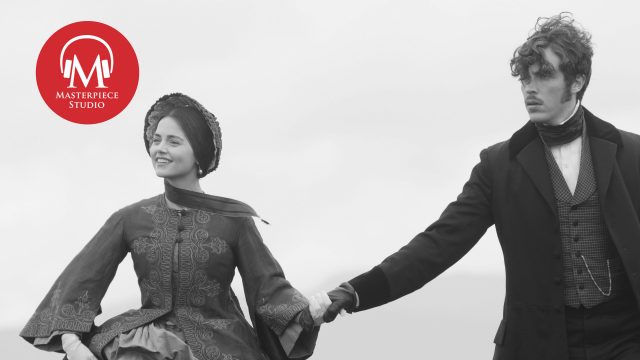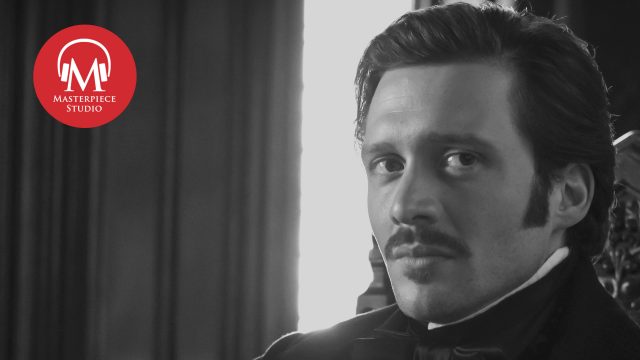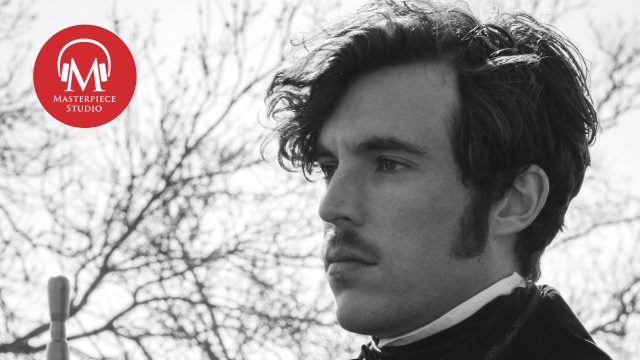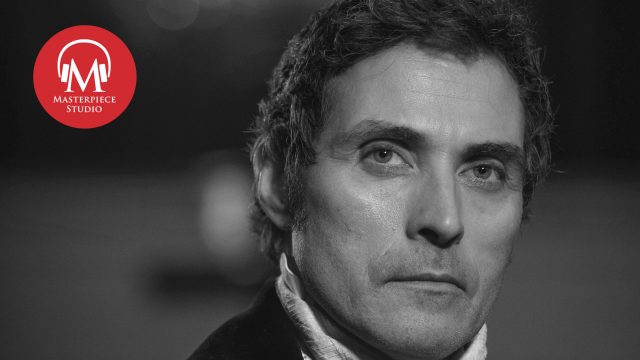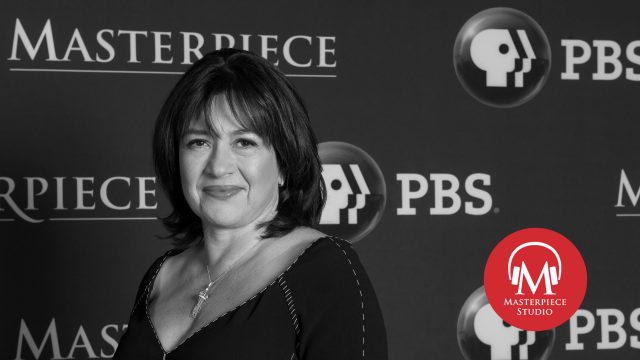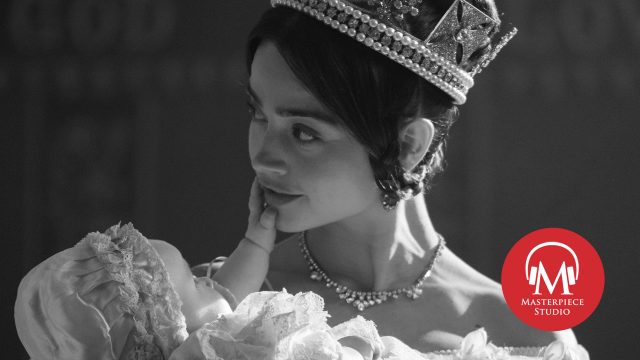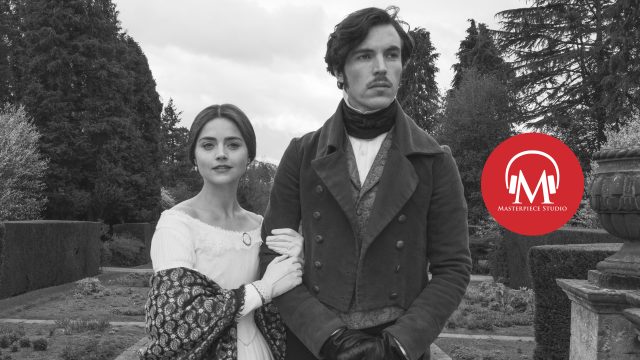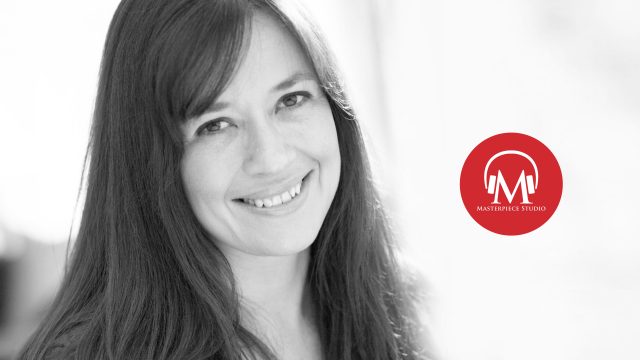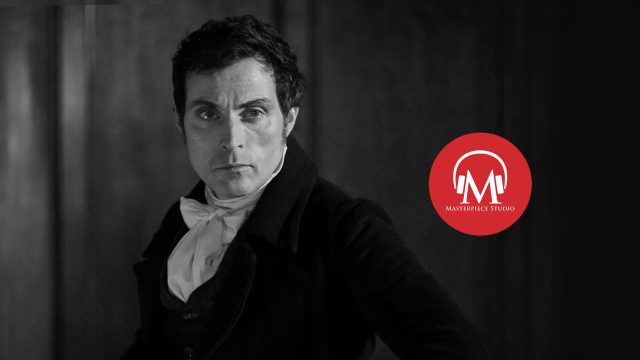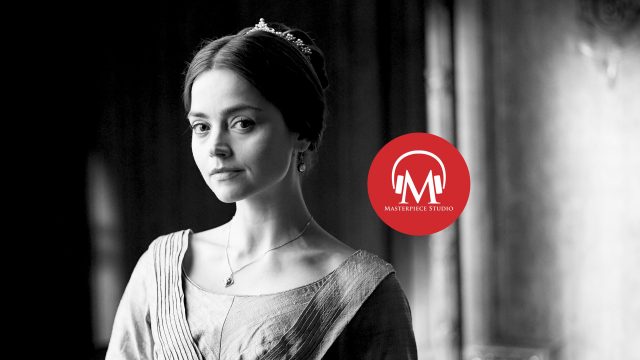Nancy Skerrett snuck into her job as a dresser at Buckingham Palace under an assumed name, and came to win Queen Victoria’s heart in the past three seasons of the show. And as part of the audience-favorite couple, “Skerrettelli,” actor Nell Hudson has won viewers’ hearts as well. Hudson tells us why her Nancy Skerrett is an inspiration in her own daily life, and what she’s learned from playing so many period-drama characters in her career.
Download and subscribe on: iTunes | Spotify| RadioPublic
Transcript
Jace Lacob: I’m Jace Lacob, and you’re listening to MASTERPIECE Studio.
Queen Victoria’s elusive head dresser, Nancy Skerrett, arrived at Buckingham Palace under an assumed name. She stepped in to royal service to cover for the real Eliza Skerrett, diverting a portion of her earnings to her pregnant cousin as a way to keep her quiet.
CLIP
Eliza: Mrs. Collins put my rent up last week. I can’t manage any more on what you give me.
Skerrett: I told you I don’t get paid till Michaelmas.
Eliza: I’m sure you’ll think of something! A resourceful girl like you. I’m sure a palace is full of trifles no one would miss.
Skerrett: I’m no thief.
Eliza: And you’re no Eliza Skerrett, neither.
Jace: But Skerrett quickly blossomed in her job, fully embracing her position and coming to a quiet kind of friendship with Her Majesty the Queen.
CLIP
Victoria: Well, we must make the most of what the Prince calls ‘the amenities’. However unamenable they might seem.
Skerrett: You’ll be alright, your majesty.
Victoria: Do you suppose it’s possible actually to breathe under the water?
Skerrett: I really don’t know, ma’am. Fish do it?
Jace: Now Nancy has left the Royal Household: she’s married her fellow former royal servant Charles Elmé Francatelli, and is expecting her first child just as their new hotel is set to open. But Skerrett’s happiness is short-lived. On the brink of success outside the Queen’s shadow, Nancy succumbs to cholera and rapidly dies, with her husband by her side. After three seasons on Victoria, actor Nell Hudson wasn’t quite ready to say goodbye to her Mrs. Skerrett.
Nell Hudson: That’s kind of the joy of playing a character for so long is that it definitely becomes part of you. She’s very pro her own autonomy and very sort of hesitant to give that up for love, and I’d like to think that I’m like that too, so we’ve got that in common.
Jace: Hudson joins us to talk cholera, corsets, and the perils of period drama. Then Victoria creator, head writer, and executive producer Daisy Goodwin returns for the next round of Victoria fact or fiction.
Jace: And this week we are joined by Victoria star Nell Hudson. Welcome.
Nell: Hello. How are you?
Jace: What did you make of Nancy, or Eliza Skerrett, as she was known then, when you first read the scripts for season one?
Nell: I was completely delighted by Skerrett when I first read her on the page. I did a job called Outlander, in which I play something of a baddie, a bit of a villain, and it was kind of a role that I was known for, and it was so nice to play someone who is such a goodie. And what I love about Skerrett, playing her, is she has a very strong moral compass and it’s a great kind of anchor to which I can always go back when making decisions about what she would think or feel or do in any given situation. I can kind of rely on her to do the right thing.
Jace: Skerrett, we learn quickly is concealing a secret about her true identity. Why was this secret so dangerous, and why did she go to such lengths to reinvent herself?
Nell: So it was a complete accident that Skerrett got the job at Buckingham Palace as dresser to the Queen, which is a huge deal — coming from absolutely nothing, from poverty. Her cousin was really called Eliza Skerrett — Eliza Skerrett is not my real name — and she trained for three years to become a servant. And just when she got the job, she got knocked up by a soldier, as you do. And she offered the job to me, and said, ‘Why don’t you take the job and then we can splitsies the money and raise my child?’ somehow, with the income that she now needs, as she’s got to raise a child. So it’s incredibly dangerous that Skerrett is going into this job. She has absolutely no training whatsoever and she’s just winging it, really, and it’s not just her livelihood, but it’s the livelihood of her cousin who’s given her the job in the first place, who’s opened the door to an incredible new life for Nancy, my real name. So yeah, it’s my own life, but it’s also the life of my cousin, who’s given me this opportunity, and her child.
Jace: Now there’s a very intimate relationship between any lady and her dresser, but the relationship between Nancy and Victoria seems to go even deeper. How would you categorize their dynamic over these three seasons?
Nell: I would categorize it almost as a sort of confidante relationship. Victoria was notoriously sort of relaxed, and she didn’t really stick to kind of normal social boundaries when it came to her servants, if she liked one of her servants then she considered them a friend, and had no qualms whatsoever about, you know, treating them as such and not kind of treating them as if they were below her in the hierarchy of things, which they absolutely were. So yeah I think Victoria realizes quite quickly that Nancy has her wits about her and is a sort of calm, guiding, constant presence for Victoria, which makes it all the harder for Skerrett to ever leave.
Jace: Well that’s what’s interesting to me. Victoria does give her a second chance after the truth comes out on her identity. What does it mean to Skerrett that Victoria changes her mind and actually gives her a new position?
Nell: It means absolutely everything to her. It was such a huge thing to have done to have risked everything and lied about who she was and her qualifications, and for Victoria to overlook that and accept her because of the time Skerrett’s worked for her, she’s actually got to know the real person, is just a huge vote of confidence in her, not just as a dresser, but as a person and as a friend.
Jace: How much of Skerrett is there within you? Are you at all similar?
Nell: I think she’s bled into me a bit, actually. I mean, I’d like to be more like her, she’s way nicer than me and probably makes better decisions than I do and is probably harder working than I am, but it’s definitely kind of informed me as a person. I genuinely sometimes am like, ‘What would Skerrett do in this situation?’ That’s kind of the joy of playing a character for so long is that it definitely becomes part of you. So I think we’re similar in some ways. I think Skerrett’s kind of a feminist character for the time that she’s living in. She’s very pro her own autonomy and very sort of hesitant to give that up for love, she’s kind of feminist in that way, and I’d like to think that I’m like that too, so we’ve got that in common.
Jace: I do definitely see her as a feminist character in that respect. She doesn’t just support Victoria, but all of the women in her life both financially and emotionally. Whether that’s Eliza or Ms. Cleary or Abigail.
Nell: Yes.
Jace: Why does she work to raise up other women at a time when women, despite having a Queen on the throne ,don’t have a lot of personal or political power?
Nell: That’s a really interesting question. I think she and Francatelli have this thing in common, which is that they’ve come from nothing and they’re making something of their lives and they’re kind of the birth of the middle classes in a way, of being a self-made businessman and businesswoman. And I think that Skerrett, because of that kind of openness to the world and seeing the world as a place where you can do anything and anything is possible, she sort of treats everyone in the same way, if that makes sense?
Jace: Yeah.
Nell: Yeah.
Jace: And you mentioned the the F word. Francatelli.
Nell: Yeah.
Jace: One of my favorite moments in their courtship is of course the meringue N that Skerrett finds on her pillow after Francatelli learns her true name, and it’s really a beautiful and touching moment. But it’s also rife with danger due to the sort of secret. So what was it like filming this scene?
Nell: Well it’s really nice, because my name’s Nell, which also begins with an N. So I just imagined it was for me. I just went and I was like, ‘How lovely! There’s an N for Nell.’ Not really, but no, it was it was really nice to film that one. I was meant to be in a pretty sort of white cotton linen nightgown with my hair down in the sort of long bedtimey plait, and I was really looking forward to it because in series one, you only ever really saw Skerrett looking quite austere in her sort of drab gray dress and with her you know quite formal very unflattering Victorian plaits behind the bun hairstyle, so in that scene, I remember looking forward to being like ‘Oh great, I’ll get to sort of have a different look!’ And then on the day they decided that it wasn’t going to happen. So funnily enough it was a very romantic scene, but I also remember being disappointed that I didn’t get to have a change of outfit.
Jace: Following that comes the hot chocolate scene.
CLIP
Skerrett: What is that?
Francatelli: The cure for every ailment known to woman is chocolate.
Skerrett: Hot chocolate? Really? Hmm…why don’t you give her one of your little wafers? Then she can dip it in.
Jace: Do you feel that their flirtation here toes the line with the risque by Victorian standards?
Nell: I think it does. Do you know that scene our director, Oliver Blackburn, gave me such an intense note for that scene which was, ‘When you taste this chocolate, imagine that the last time you tasted chocolate was sharing some on your mother’s deathbed with her before she passed away.’
Jace: Wow.
Nell: I know. And I was just like, ‘What? That’s a whole other backstory that I haven’t ever thought about before.’ But I think Ollie wanted to make the moment as packed as possible — just all the feelings — as high stakes as possible. So he really wanted that kind of intense visceral reaction to the chocolate. So I remember just being, ‘OK, this is a big thing.’ And he also definitely encouraged us to be quite sexy and flirty and risqué with the Francatelli-Skerrett relationship. He sort of really pushed us to be quite naughty with it, and quite fun because they are downstairs characters, and I think that they you know are just a little bit less formal and uptight than their upstairs counterparts.
Jace: And that reaches a sort of climax in the bombe surprise scene. The cracking of the chocolate shell that the plunge of the spoon, Nancy and Charles feeding each other a little bite. I’d love to get your take on what it was like filming this very sensual scene.
Nell: It was really good fun. I have a thing which is that I hate watching TV shows or films when actors don’t really eat the food they’re meant to be eating especially when it’s a scene that basically centers around the food. And I always think that you know it’s probably actors being a bit vain and being like, ‘Oh I don’t want to eat too much food.’ So I very sort of decidedly was like, ‘No I’m going to eat the ice cream, take after take after take,’ which at first, it was great and it was such a nice delicious thing to be eating in a scene, and then by about the tenth take I suddenly realized why actors don’t always eat in every single take, and I started to feel really sick because I’d been eating quite large pointed mouthfuls of chocolate ice cream for like two hours. But it was a lot of fun to shoot.
Jace: So death by chocolate.
Nell: Death by chocolate, exactly.
Jace: Skerrett is presented with an agonizing choice at the end of season one — she can follow her heart, or she can sacrifice her personal desire for her professional duty. Why does she choose the latter here?
Nell: I think at this point Skerrett still has her cousin, Eliza, as you say depending on her, as well as her little niece, and the stakes are just too high. If she decided to leave the palace and leave her job for Francatelli, then she’d be leaving the person who got her the job in the first place completely afloat. And I think that Skerrett’s, you know, ultimately got too much integrity to do that. So I think that was sort of the main reason. And then of course she is duty bound to Victoria. And by this point has developed a real intimacy with the Queen and feels very tied to her as well.
Jace: She’s a goodie.
Nell: She is a goodie.
Jace: She’s a goodie. I asked Ferdinand Kingsley what it was like working with you so I would love for you to have the opportunity to turn the tables on Ferdinand.
Nell: Ha ha ha. Yeah. Gosh it’s so funny. He’s great to work with. I think it’s funny, like, almost the more you get to know someone, it can be harder to act with them, you know each other so well that if you catch their eye in the wrong moment and you sort of see a little bit of see a little bit of a smirk or something, then it can really throw you off. But it also means that you have this wonderful trust that when you know someone that well, you feel completely safe around them. And that was very necessary with some of the stuff we’ve had to film in series three, because it got pretty intense.
Jace: I love Nancy and Charles’ wedding at St. Bride’s with Brody in attendance. Do you think there’s any part of Skerrett that considers not showing up to the church, or is she all in at this point?
Nell: Oh absolutely. I’m sure there’s a bit of her that is absolutely terrified to go. And he sort of springs it on her, doesn’t he? He just sort of shows up in her in her office at the palace one day, and says, ‘Look I’ve set the date at the church. You better bloody be there.’ So it’s a bit of an ultimatum from him, really. And he’s calling her bluff, because she says I love you, and I want to marry you and she’s been saying it for a really long time and I think he’s had enough. So I think there’s definitely a bit of her that is just terrified. I was looking into sort of your rights as a married woman in Victorian times, and it’s so ridiculous. You really, you give up everything. Any worldly property you have goes to your husband and you can’t leave anything to your children in your will. Only your husband can, and if he has children with a different woman, he can leave your property to those illegitimate children if he wants to.
Jace: Wow.
Nell: It’s crazy. You really are giving up a lot. And of course Francatelli, we hope wouldn’t ever do that to Nancy. But yes, it’s a huge, huge decision for her to actually go ahead and tie the knot with him.
Jace: Skerrett jumps into the sea to save Victoria’s life when tries to swim and she nearly drowns.
CLIP
Victoria: (Heavy Breathing)
Skerrett: Your Majesty! Your Majesty!
Feo: Drina!
Victoria Well, I think we have established that the Queen of England is not a fish.
Jace: Do you think that that moment underpins her sense that the Queen will always need her? Is that why Skerrett is perhaps so reluctant to leave the Queen’s service even after marrying Francatelli?
Nell: Oh absolutely. Yeah definitely I think that it’s a very important moment for Skerrett, because she’s literally saving the Queen’s life. I mean talk about the Queen needing her in that moment. Yeah, absolutely. I think dramatically that’s sort of what the scene means for Skerrett.
Jace: When did you find out that Skerrett was going to be killed off this season?
Nell: So I’ve actually sort of made quite good friends with Daisy Goodwin the writer, and Ottilie Wilford, her daughter who also writes some of the episodes, over the three years that we’ve been making Victoria. And I think we were out for dinner shortly before starting work on series three and they sort of announced it to me together, they broke the news. But to be honest with you, I knew that I was going to do three years on Victoria, when I signed up, I signed up for three series. Obviously it’s very heartbreaking and sad, and I really love Skerrett, I really care about her and it’s totally devastating that she meets a tragic end. But on a sort of personal level as an actress, I was quite excited that she got to leave in such a dramatic way.
Jace: Before this next question, a brief word from our sponsors…
Jace: Now was it morning sickness that compelled her to the apothecary to obtain a tonic in the first place?
Nell: Yes exactly. So, Big news: Skerrett finds out she’s pregnant! They’ve left the palace, they’ve got married. And then bang: she’s knocked up! So she’s suffering from morning sickness and decides to go and see an apothecary to see if there’s any medicine that she can get to help her feel better. However, I like the way that they shot it in that the apothecary offers her one tonic which helps with morning sickness and one tonic which will help her not be pregnant anymore if she doesn’t want to be. And I think that way they’ve left that scene is that we don’t know which tonic Skerrett chooses, at first.
Jace: Skerrett’s decline is horrific to watch as she succumbs to cholera. How difficult were these scenes to shoot physically and emotionally?
Nell: Yeah, physically it was pretty exhausting, actually. I was sort of screaming in pain, again and again and again, take after take after take. And it really takes it out of you. But I think that sort of served, I suppose, the scene in a way in the circumstances because she’s dying, you know? Yeah. And so a few takes in, I was, my voice was quite ragged in a way that sort of worked for how unhealthy she is meant to be in that scene. Yeah, it was hard. And the scene where Victoria comes and says goodbye to Skerrett on Skerrett’s deathbed was really — oh, it was very emotional. And Jenna was so great on that day and just very kind of generous and held you know in a way that sort of makes you feel more emotional, you know, when you’re like around someone and you’re trying not to cry and they’re really keeping it together. Yeah, it was it was really heavy.
Jace: How challenging is it to film a death scene?
Nell: I was much harder than I thought, actually, yes. Because it’s a very fine line. It could so easily be funny. The makeup really helped, actually, because they really you know covered me in the sort of thick, white, almost greeny-gray layer of makeup that, you know, I looked terrible. I took a selfie and sent it to my mom, and you know, she was really upset. It helped so much, funnily enough, things like costume and makeup can really help you sort of get into the mindset that you need to be in.
Jace: How heartbreaking is it that Francatelli names his new hotel Nancy’s?
Nell: Oh god it’s too much isn’t it? Again, cried a lot when I read that in the script. Yeah. God, it’s a really, really heartbreaking episode isn’t it? And it’s one of Ottilie’s episode, funnily enough, Ottilie is Daisy Goodwin’s daughter and she writes only a couple of the episodes. But it’s one of her ones and I think she’s done such a brilliant job. I think that it’s really, really beautiful.
Jace: Looking back at the last three seasons of Victoria, do you have a favorite scene?
Nell: Oooh! I’ve got to say I really loved the Christmas special at the end of series two. We had a ball where all the upstairs characters came down into the servant’s quarters and danced with each other. And that was really nice, because you had sort of Queen Victoria dancing with Mr. Penge, and I think I’d danced with Prince Ernst, and it was just so much fun.
CLIP
Penge: Your Majesty. Welcome to the Servant’s Ball, Your Roayl Highness. May I have the honor, ma’am?
Victoria: I had forgotten what a good dancer you are, Penge.
Penge: Any man would be light on his feet with such a partner, ma’am.
Nell: And it’s funny when we filmed scenes in the servant’s quarters, that’s just a more relaxed atmosphere, anyway, and it was really nice for all the all the guys who are always filming upstairs scenes to come down to our neighborhood and sort of have a sense of what it feels like to be down there.
Jace: What was the final scene you shot on Victoria?
Nell: Oh god. It was such a shame. So really kindly they scheduled this was the final Skerrett and Francatelli scenes chronologically which never happens as I’m sure you know with shooting it’s all sort of shot out of sequence and they very kindly sequenced it so that Skerrett finds out she’s pregnant, and then she finds out she’s ill, and then her decline and then her death, they shot in order, which was great for me, because it meant I got to sort of experience it as it was happening, and I was very clear in my head about what was going on. And so I finished, I think, with my death scene. And was like, ‘That’s a wrap!’ And then when I got a call saying, like, ‘We’ve just got to do one tiny pick up of you walking along the street,’ which was so anti-climatic. And it was so funny, because I was all set to go on holiday to Italy for a week. So I was like, ‘I’m wrapping Victoria, and then I’m going to Italy for a week and I’m going to eat all the pasta in the world and drink all the wine,’ and then I was like, ‘Oh damn! I’ve got to do to just do one more scene.’
Jace: What will you miss most from your time on Victoria?
Nell: The people, definitely. I’ve just made such good friends on the show and it’s been a total joy to work with them every day. It’s been you know ridiculous being literally paid to go into work with some friends and have a nice time.
Jace: Did you take any mementos from the set with you on your last day?
Nell: I totally did, and I stole them and they don’t know yet, as far as I know. I took one candlestick from the upstairs and I took one wooden spoon from the downstairs.
Jace: Oh I like that, something from upstairs and something from downstairs.
Nell: Yeah because Skerrett’s one of the few characters that kind of gets to drift between those worlds, really. So I thought she needed one of each. Also I got the loveliest gift from Jenna. She gave me an antique Victoria hairpin on my last day as a goodbye present. It’s really beautiful, and obviously, Skerrett did Victoria’s hair and that was kind of how she got Victoria to sort of open up to her was in those little sessions when she was doing Victoria’s hair, so it was really symbolic of that, and it’s just a beautiful thing as well, and that was really lovely.
Jace: I’ve heard the cast gets together to watch each episode of Victoria. How do you think your castmates will react when they watch this episode?
Nell: They better all bloody cry, is all I can say. They better all be absolutely devastated. I know I will be. I watched some of it the other day, just in some post-production stuff I got to see it, and definitely started to well up. So yeah, I’m sure that everyone will be in pieces.
Jace: True or false: you know how to drive a tractor.
Nell: True, absolutely true. I grew up on a farm. I can drive a tractor.
Jace: Did you always want to be an actor?
Nell: No. No I didn’t figure that out until I was like 17, 18. And everyone was going off to university and I was like, ‘What do I do? I don’t want to write another essay ever again.’ So I thought I would give acting a go.
Jace: True or false: you had your first cup of coffee when you were six years old?
Nell: I did. My dad gave me coffee at age six and he sweetened it with lots of sugar so that it would be palatable to a six year-old and obviously that was just delicious. So yeah I’m a big time coffee drinker I drink coffee before I go to bed. But not with any sugar in it anymore.
Jace: In addition to acting you’re also a singer-songwriter and a musician. You play ukulele and keyboard, and once supported Jules Holland in concert.
Nell: Yes.
Jace: Is music something you’d like to explore more professionally?
Nell: Oh absolutely, yeah. I’d love to do a musical, or play a character who sang or played an instrument. I always think that someone needs to cast me as Joni Mitchell, because I can sing and I have big teeth. So that would work out just perfectly. I love singing and songwriting and music in general, it would be great to bring that into a role.
Jace: You starred on Outlander as Laoghaire, Claire’s rival for the affections of Jamie Fraser. What was it like playing this character that does such terrible things in the name of love?
Nell: It was a lot of fun! Yeah, I mean, who doesn’t love getting a chance to sort of, you know, be a really dramatic archetypal villain, really? There’s a line that she has, where Claire’s on trial for witchcraft because of Laoghaire. And it looks like she might be burned at the stake and my character says to her character, ‘I shall dance upon your ashes,’ which was just such a great line. So I just got to really relish being awful.
Jace: Is it true that you initially didn’t know how to pronounce Laoghaire’s name?
Nell: Yes! I mean who would? L-a-o-g-h-a-i-r-e. Like. What is that? Yeah everyone calls me ‘Leghair,’ which is fine. No, I didn’t and I was in the middle of nowhere when I got the sell take-through to do Outlander. And I was like, ‘How on earth do you say this name?’ And so I was literally in this country cottage that didn’t have wi-fi or anything. So I was running down to the local village library to use Google to look up how you might pronounce that and I heard a man with a Scottish accent on the street and I just grabbed him and was like, ‘How do you say this?’ And he told me, and he looked a bit alarmed, but he did tell me it was Laoghaire.
Jace: What was it like to be aged up in vast amounts of make up for season three of Outlander?
Nell: It was so depressing, man. It was really grim. Yeah. I mean I suppose it’s also quite liberating, because you just don’t care anymore because you’re not there to look pretty. I think, early series one of Outlander, Laoghaire’s meant to be, you know, quite attractive, she is attractive enough to ensnare Jamie Fraser anyway, and playing a character like that where that’s just not part of your arsenal, you’re just, you know, haggard. It’s quite freeing, because, you know, I’m in my 20s and I’m probably shallow and vain and silly, and so I got to just kind of let loose a bit.
Jace: Now between Outlander, Victoria and a truly heart wrenching episode of Call the Midwife that you did, you’ve had a lock on period dramas. Are you looking to move deeper into contemporary drama now that your time on Victoria is at an end?
Nell: I think so. I think I’d love to do a bit of theatre again, to be honest, to have that sort of live buzz of doing theatre, and also just to kind of stretch those muscles out. I haven’t done any theatre for like three years, I think? So I think I’m probably a bit kind of flabby in my techniques. So it’d be good to get back on the stage and do that again. Yeah, I’m sort of not consciously really trying to do anything other than get another job.
Jace: Would you come back to Victoria as a ghost?
Nell: I absolutely would. I definitely would. It would be really fun to go and haunt Buckingham Palace.
Jace: Nell Hudson, thank you so very much.
Nell: Thank you very much. It was lovely talking to you.
Jace: And we are back with Daisy Goodwin. Welcome.
Daisy: Hi, Jace!
Jace: We see the results of the cholera outbreak in Soho. There’s filth and death everywhere. How deadly was the Broad Street cholera outbreak?
Daisy: Very deadly. I mean, cholera kept coming back in the capital, really until the Great Stink of 1857, when they completely changed the sewage system of the capital. But basically what had happened is that you’ve got more and more people living in London and no sewage system. So basically, all the sewage would go into the water table, and that would mean that wells would become infected. And so the water became literally, the wells would become a death trap. And the Broad Street Pump become sort of an infamous example of that. Because they didn’t realize then that cholera was connected to contaminated water. They had all these theories about it, that it was airborne, that it was in the air, that it was transmitted by foreigners, by fleas. They didn’t realize that it was actually from water.
Jace: And so fact then, a water pump on Broad Street was the direct cause of this outbreak.
Daisy: Absolutely yes. That is correct. And it was identified by John Snow.
Jace: Rather than the miasmata theory.
Daisy: Yes, John Snow was somebody who painstakingly kind of looked at the evidence and he realized that, in fact, the source of the epidemic came from this pump and the reason he realized this was — as we have in the show, there’s this woman who’s from Hampstead who dies of cholera, and he can’t understand why she’s such an outlier until he finds out that she goes to this pump in Broad Street to get water because she thinks it has health-giving properties.
Jace: Was Albert’s election to Chancellor of Cambridge as divisive as it appears here?
Daisy: Absolutely, yes. I mean a lot of people didn’t want him as Chancellor because he wasn’t prepared to just come and sort of turn up in his gown and do stuff, he wanted to actually have a real role in the running of the university and he wanted to change the curriculum, which he did. And everybody thought he’d just be elected. And then there was this move to stop him, and that was very difficult for Albert. But you know, he prevailed in the end.
Jace: A soprano performs for Victoria. Is this meant to be Jenny Lind, the celebrated Swedish opera singer?
Daisy: It certainly is meant to be Jenny Lind, the famous Swedish opera singer, last seen in The Greatest Showman.
Jace: Fact or fiction: did Victoria cross paths with Florence Nightingale?
Daisy: This is fiction. She didn’t meet Florence Nightingale then. She certainly did meet her 10 years later, during the Crimean War and they became, you know, very, I would say friendly. Two powerful women fighting against the male establishment. But Florence Nightingale did work in a cholera hospital, so I thought it was an opportunity too good to miss. And her baby owl was there. She did have a baby owl which she carried in her pocket.
Jace: And then that owl sadly dies in her home before she leaves for Crimea!
Daisy: I know, I know. Very sad.
Jace: Nancy obtains a tonic from the apothecary to help with her morning sickness, unaware that it is in fact infected. How common were tonics like these for women at the time?
Daisy: Very common and as the apothecary says, ‘Here’s one for women who were happy they were pregnant, and here’s one for women who aren’t. There were tonics being sold that would trigger a miscarriage as well as tonics being sold to give you strength during the first trimester.
Jace: At first this tonic reminded me of thalidomide which was also created to help with morning sickness. Where did the idea for this being the instrument of Skerrett’s demise come from?
Daisy: Well I just like the idea that, you don’t quite know where she’s getting it from, because you don’t see her go to the pump. And I thought it was interesting it was a sort of final irony that she’s doing something which she thinks is going to be good for the baby, and then that turns out to kill her. It’s very sad.
Jace: Fact or fiction: Francatelli owned an establishment called Nancy’s.
Daisy: I’m afraid that’s fiction.
Jace: The choice of that name was heartbreaking to me considering both Nancy’s death and the way in which Francatelli discovered her name in season one. Why did you decide to end the episode on this note, and when did you realize you’d use Nancy’s as the name for his new establishment?
Daisy: Well it just seemed to be the perfect thing, because he was going to call it The Palace, and then he realized that actually, no, we’re going to call it Nancy’s. I mean, it was just, you know, sometimes those things just fall into place and it just seemed like the perfect ending.
Jace: In addition to The Modern Cook, Francatellii would go on to write a number of books including A Plain Cookery Book for the Working Classes. With his departure from the palace and the death of Nancy, is this the end of Fracatelli’s story on Victoria?
Daisy: Certainly for this season, certainly for this season. Never say never. I love Francatelli, so I’d love to have him back.
Jace: Daisy Goodwin, thank you so much.
The most dastardly addition to the Victoria cast this season is definitely Henry John Temple, Lord Palmerston, the ever-so prepared British Foreign Secretary who seems ready to ascend to the Prime Ministership whenever he sees fit.
Laurence Fox: I say it’s just the shape of my face. And I think I’ve got that sort of face you know, that kind of angular tall British superior thing. I don’t feel that way inside. I think I just look like that. My resting bitch face is posh boy.
Jace: Actor Laurence Fox reflects on his first season of Victoria, eight seasons of Lewis, and why he always seems to play well-dressed toffs, next week on the podcast.
MASTERPIECE Studio is hosted by me, Jace Lacob and produced by Nick Andersen. Elisheba Ittoop is our editor. Susanne Simpson is our executive producer. The executive producer of MASTERPIECE is Rebecca Eaton.
Victoria Podcasts 20 More Podcasts
MASTERPIECE Newsletter
Sign up to get the latest news on your favorite dramas and mysteries, as well as exclusive content, video, sweepstakes and more.








